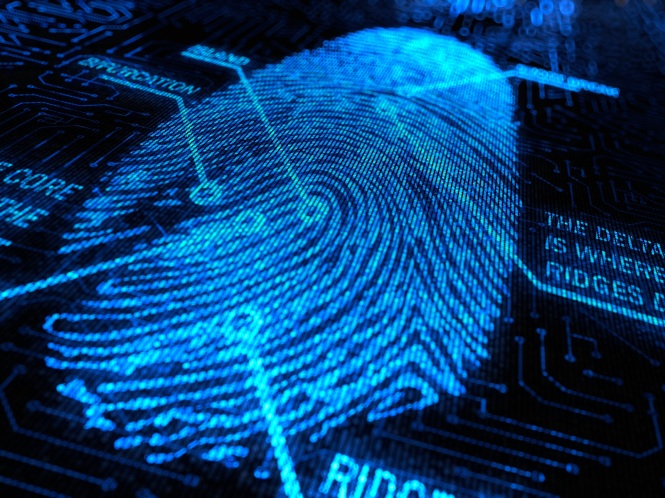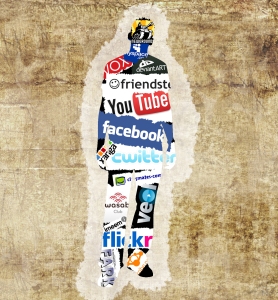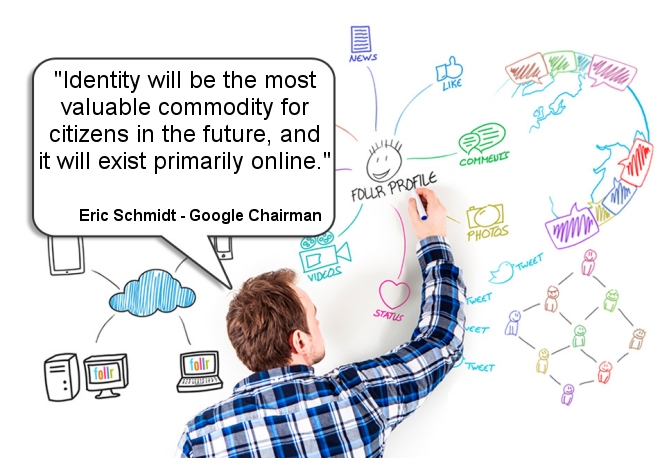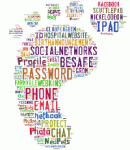 Your Online profile Digital Identity is a term used to describe the persona of an individual which presents across all the online communities that you’re a member of. When we use sites or services like Facebook, Twitter, Amazon, Ebay, Google or LinkedIn, we leave a ‘digital footprint‘. Every photo you share, posts you make, items you search/buy, tweets you twurp or email sent, you leave a footprint. The footprints you make are used to generate your online persona and silently build an online profile of you. There are many websites that are starting to do this with striking degrees of accuracy.
Your Online profile Digital Identity is a term used to describe the persona of an individual which presents across all the online communities that you’re a member of. When we use sites or services like Facebook, Twitter, Amazon, Ebay, Google or LinkedIn, we leave a ‘digital footprint‘. Every photo you share, posts you make, items you search/buy, tweets you twurp or email sent, you leave a footprint. The footprints you make are used to generate your online persona and silently build an online profile of you. There are many websites that are starting to do this with striking degrees of accuracy.  This information that is collected can be used to target you for marketing purposes, data collection, profile building, profile scanning, DNA data collecting, analysis & observation. I, like most of you would have assumed, the trails we leave are just for marketing. However, now that I am really thinking about what could very likely will be its other uses, its easy to see how our online information can be miss used. The black-market of the future will sell real lives or invented identity for a costly fee. People in the future wanting to start over and become someone else will have the ability to do so. I believe that society as we see it now, will in 30-40 years time, be drastically different. Picture a futuristic world where entry to buildings is based on an intelligence system that analyses your
This information that is collected can be used to target you for marketing purposes, data collection, profile building, profile scanning, DNA data collecting, analysis & observation. I, like most of you would have assumed, the trails we leave are just for marketing. However, now that I am really thinking about what could very likely will be its other uses, its easy to see how our online information can be miss used. The black-market of the future will sell real lives or invented identity for a costly fee. People in the future wanting to start over and become someone else will have the ability to do so. I believe that society as we see it now, will in 30-40 years time, be drastically different. Picture a futuristic world where entry to buildings is based on an intelligence system that analyses your  human presence & matches it ti its online data on you in a matter of seconds. The online data footprints we leave are all tracked, monitored & recorded. From now I recommend you to be careful what you share. Sites like specify, intel, pipl or even a quick google search will show what information about you is accessible to the public.
human presence & matches it ti its online data on you in a matter of seconds. The online data footprints we leave are all tracked, monitored & recorded. From now I recommend you to be careful what you share. Sites like specify, intel, pipl or even a quick google search will show what information about you is accessible to the public.
Every movement we make online its tracked so the image above as an imaginative visual of you. Executive Chairman of Google, Eric Schmidt said:  Online Developments in Anonymity.
Online Developments in Anonymity.  However anonymous you think you are online, even by creating a pseudonym, you can be ID’d. Andrew Lewman, The executive director of the Tor Project plans to re-anonymise the web. The Tor software confuses a users web traffic by bouncing the signal to different locations, so anyone that is watching is unable to trace who you are or where you are. Lewman spoke about how important our identity online is: “The ability to be anonymous is increasingly important because it gives people control, it lets them be creative, it lets them figure out their identity and explore what they want to do, or to research topics that aren’t necessarily ‘them’ and may not want tied to their real name for perpetuity,” Aleks Krotoski, has been writing about interactivity since 1999. She has a PhD in the social psychology of relationships in online communities. She also writes articles feature pieces and opinion pieces. While browsing, I came across an article she wrote on Online Identity: Is authenticity or anonymity more important?? The article is well worth a read as she questions and quotes high authority figures in the interactive world. How To Be ‘Identity Savvy’ online & to watch what footprints you leave
However anonymous you think you are online, even by creating a pseudonym, you can be ID’d. Andrew Lewman, The executive director of the Tor Project plans to re-anonymise the web. The Tor software confuses a users web traffic by bouncing the signal to different locations, so anyone that is watching is unable to trace who you are or where you are. Lewman spoke about how important our identity online is: “The ability to be anonymous is increasingly important because it gives people control, it lets them be creative, it lets them figure out their identity and explore what they want to do, or to research topics that aren’t necessarily ‘them’ and may not want tied to their real name for perpetuity,” Aleks Krotoski, has been writing about interactivity since 1999. She has a PhD in the social psychology of relationships in online communities. She also writes articles feature pieces and opinion pieces. While browsing, I came across an article she wrote on Online Identity: Is authenticity or anonymity more important?? The article is well worth a read as she questions and quotes high authority figures in the interactive world. How To Be ‘Identity Savvy’ online & to watch what footprints you leave  Statistics from CNN show that Identity Fraud is on the rise and growing since 2010 where the figure rose from 10.2 million to 13.1 million in 2013. I have formed a few useful steps in how you can protect your identity online & use online applications wisely. We don’t need to live like hermits in tinfoil, but having a degree of awareness helps.
Statistics from CNN show that Identity Fraud is on the rise and growing since 2010 where the figure rose from 10.2 million to 13.1 million in 2013. I have formed a few useful steps in how you can protect your identity online & use online applications wisely. We don’t need to live like hermits in tinfoil, but having a degree of awareness helps.
- Use strong passwords and do not share them with anyone. A random combination of numbers, letters and punctuation over eight characters long is recommended. Do not repeat a password that is used for other accounts. If one password is leaked, at least your other passwords are different.
![keep-calm-and-keep-your-password-secret[1]](https://aoifenimhurchucybercultures.files.wordpress.com/2015/03/keep-calm-and-keep-your-password-secret1.png?w=257&h=300)
- Check your billing and account records carefully to detect potential identity theft early. Online banking updates almost immediately. When logging in to your online banking system, ensure that you have complete privacy.
- If your signing up to newsgroups, offers, mailing lists, use your less frequently used email address. Be careful when signing up to mailing lists – spammers use the unsubscribe button to validate addresses.
- Only share your primary email address with people you know.
- Only make online purchases from companies that have a clear privacy policy and secure payment pages. There usually obvious to spot, Paypal for instance, have a specific size, and locations on websites they appear. Using Paypal is usually a safer alternative to using your bank card details online.
- Think before you fill out online forms. Ask yourself, how much information do I need to enter into this site?
- Keep a record of what information you have given to whom.
- Be careful how much personal information you post or reveal online.
- Users who share addresses, telephone numbers, birthdays, and other personal information put themselves at a greater risk of identity theft, stalking and harassment. This includes information you post on social media.
- If you use social networking sites, adjust your privacy settings to control the amount and type of information you want to share, so that people you don’t know very well can only see certain parts of your profile.
- We all have fun on social media, checking in, taking pictures of what we are doing and sharing them, but be careful how often you do this. Out and about statuses let people know your not at home. Take this lollipop!
- Think about what information you may have online that is spread across multiple sites. Identity thieves can piece together your identity from public information piece by piece like putting together a puzzle. The footprints we leave can not be washed away.
 Mario Rodriguez who is a faculty member of Communications and Media Studies Department at Stetson University gave a TED talk the 12th of April 2013 on Facebook Privacy & Identity – Exploring your digital self. He studied Facebook privacy for his dissertation and compiled alot of primary research you might find interesting. His particular emphasis on privacy is not only relevant to the job market but shows that online privacy is an essential topic for cultivating 21st century media literacy. He also discusses Social media privacy and questions our representation online.
Mario Rodriguez who is a faculty member of Communications and Media Studies Department at Stetson University gave a TED talk the 12th of April 2013 on Facebook Privacy & Identity – Exploring your digital self. He studied Facebook privacy for his dissertation and compiled alot of primary research you might find interesting. His particular emphasis on privacy is not only relevant to the job market but shows that online privacy is an essential topic for cultivating 21st century media literacy. He also discusses Social media privacy and questions our representation online.
